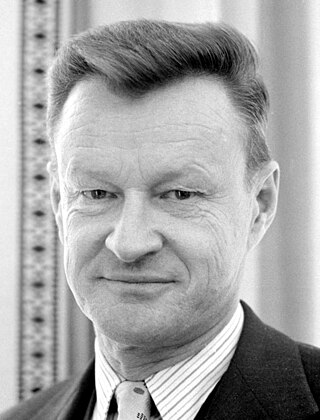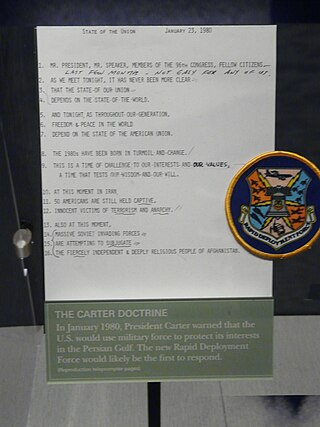
Zbigniew Kazimierz Brzeziński, known as Zbig, was a Polish-American diplomat and political scientist. He served as a counselor to Lyndon B. Johnson from 1966 to 1968 and was Jimmy Carter's National Security Advisor from 1977 to 1981. As a scholar, Brzezinski belonged to the realist school of international relations, standing in the geopolitical tradition of Halford Mackinder and Nicholas J. Spykman, while elements of liberal idealism have also been identified in his outlook. Brzezinski was the primary organizer of The Trilateral Commission.

The Carter Doctrine was a policy proclaimed by President of the United States Jimmy Carter in his State of the Union Address on January 23, 1980, which stated that the United States would use military force, if necessary, to defend its national interests in the Persian Gulf. It was a response to the Soviet Union's intervention in Afghanistan in 1979, and it was intended to deter the Soviet Union, the United States' Cold War adversary, from seeking hegemony in the Persian Gulf region.

Cyrus Roberts Vance was an American lawyer and United States Secretary of State under President Jimmy Carter from 1977 to 1980. Prior to serving in that position, he was the United States Deputy Secretary of Defense in the Johnson administration. During the Kennedy administration he was Secretary of the Army and General Counsel of the Department of Defense.

Harold Brown was an American nuclear physicist who served as United States Secretary of Defense from 1977 to 1981, under President Jimmy Carter. Previously, in the John F. Kennedy and Lyndon B. Johnson administrations, he held the posts of Director of Defense Research and Engineering (1961–1965) and United States Secretary of the Air Force (1965–1969).

The Single Integrated Operational Plan (SIOP) was the United States' general plan for nuclear war from 1961 to 2003. The SIOP gave the President of the United States a range of targeting options, and described launch procedures and target sets against which nuclear weapons would be launched. The plan integrated the capabilities of the nuclear triad of strategic bombers, land-based intercontinental ballistic missiles (ICBM), and sea-based submarine-launched ballistic missiles (SLBM). The SIOP was a highly classified document, and was one of the most secret and sensitive issues in U.S. national security policy.

The National Security Archive is a 501(c)(3) non-governmental, non-profit research and archival institution located on the campus of the George Washington University in Washington, D.C. Founded in 1985 to check rising government secrecy, the National Security Archive is an investigative journalism center, open government advocate, international affairs research institute, and the largest repository of declassified U.S. documents outside the federal government. In the four decades of its history, the National Security Archive has spurred the declassification of more than 15 million pages of government documents by being the leading non-profit user of the U.S. Freedom of Information Act (FOIA), filing a total of more than 70,000 FOIA and declassification requests.
The Vela incident was an unidentified double flash of light detected by an American Vela Hotel satellite on 22 September 1979 near the South African territory of Prince Edward Islands in the Indian Ocean, roughly midway between Africa and Antarctica. Today, most independent researchers believe that the flash was caused by a nuclear explosion—an undeclared joint nuclear test carried out by South Africa and Israel.

The Nuclear Posture Review (NPR) is a process “to determine what the role of nuclear weapons in U.S. security strategy should be.” NPRs are the primary document for determining U.S. strategy for nuclear weapons and it outlines an overview of U.S. nuclear capabilities, changes to current stockpiles and capabilities, plans for deterrence, and plans for arms control policy with other nations.
The United States government classification system is established under Executive Order 13526, the latest in a long series of executive orders on the topic of classified information beginning in 1951. Issued by President Barack Obama in 2009, Executive Order 13526 replaced earlier executive orders on the topic and modified the regulations codified to 32 C.F.R. 2001. It lays out the system of classification, declassification, and handling of national security information generated by the U.S. government and its employees and contractors, as well as information received from other governments.

Launch on warning (LOW), or fire on warning, is a strategy of nuclear weapon retaliation where a retaliatory strike is launched upon warning of enemy nuclear attack and while its missiles are still in the air, before detonation occurs. It gained recognition during the Cold War between the Soviet Union and the United States. With the invention of intercontinental ballistic missiles (ICBMs), launch on warning became an integral part of mutually-assured destruction (MAD) theory. US land-based missiles can reportedly be launched within 5 minutes of a presidential decision to do so and submarine-based missiles within 15 minutes.

United States support for Ba'athist Iraq during the Iran–Iraq War, in which it fought against post-revolutionary Iran, included several billion dollars' worth of economic aid, the sale of dual-use technology, military intelligence, and special operations training. The U.S. refused to sell arms to Iraq directly due to Iraq's ties to Palestinian groups which the U.S. designates as terrorist organizations such as the Palestinian Liberation Front and Abu Nidal Organization, but several sales of "dual-use" technology have been documented; notably, Iraq purchased 45 Bell helicopters for $200 million in 1985. Of particular interest for contemporary Iran–United States relations are accusations that the U.S. government actively encouraged Iraqi leader Saddam Hussein to invade Iran, supported by a considerable amount of evidence and generally regarded as the conventional wisdom in the Arab world, but several scholars and former U.S. government officials deny that any such collusion occurred, and no direct documentary proof of it has been found.

Jimmy Carter's tenure as the 39th president of the United States began with his inauguration on January 20, 1977, and ended on January 20, 1981. Carter, a Democrat from Georgia, took office following his narrow victory over Republican incumbent president Gerald Ford in the 1976 presidential election. His presidency ended following his landslide defeat in the 1980 presidential election to Republican Ronald Reagan, after one term in office. At age 100, he is the oldest living, longest-lived and longest-married president, and has the longest post-presidency. He is also the fourth-oldest living former state leader.

Mark Francis Brzezinski is an American lawyer serving as the United States Ambassador to Poland since 2022. He previously served as the United States Ambassador to Sweden from 2011 to 2015 under President Barack Obama.

The Afghanistan conflict began in 1978 and has coincided with several notable operations by the United States (U.S.) Central Intelligence Agency (CIA). The first operation, code-named Operation Cyclone, began in mid-1979, during the Presidency of Jimmy Carter. It financed and eventually supplied weapons to the anti-communist mujahideen guerrillas in Afghanistan following an April 1978 coup by the People's Democratic Party of Afghanistan (PDPA) and throughout the nearly ten-year military occupation of Afghanistan by the Soviet Union (U.S.S.R.). Carter's successor, Ronald Reagan, supported an expansion of the Reagan Doctrine, which aided the mujahideen along with several other anti-Soviet resistance movements around the world.
Steven Aftergood is a critic of U.S. government secrecy policy. He directs the Federation of American Scientists project on Government Secrecy and is the author of the Federation publication Secrecy News.
David Laurence Aaron is an American diplomat and writer who served in the Jimmy Carter and Bill Clinton administrations. He graduated from Occidental College with a BA, and from Princeton University with an MPA. He later received an honorary Ph.D. from Occidental College. He is currently director of the RAND Corporation's Center for Middle East Public Policy.
The United States foreign policy during the presidency of Jimmy Carter (1977–1981) was dominated by the Cold War, a period of sustained geopolitical tension between the United States and the Soviet Union.
Presidential Emergency Action Documents (PEADs) are draft classified executive orders, proclamations, and messages to Congress that are prepared for the President of the United States to exercise or expand powers in anticipation of a range of emergency hypothetical worst-case scenarios, so that they are ready to sign and put into effect the moment one of those scenarios comes to pass. They are defined by the Federal Emergency Management Agency as the "Final drafts of Presidential messages, proposed legislation proclamations, and other formal documents, including DOJ-issued cover sheets addressed to the President, to be issued in event of a Presidentially-declared national emergency."
Pre-delegation authority is the practice by United States presidents to empower military commanders to initiate nuclear attacks in various circumstances. This authority is typically kept classified, so the American public has always been told that the president has the sole and exclusive authority to start nuclear war. It is not publicly known to what extent, if at all, the current U.S. president has pre-delegated their nuclear authority.












